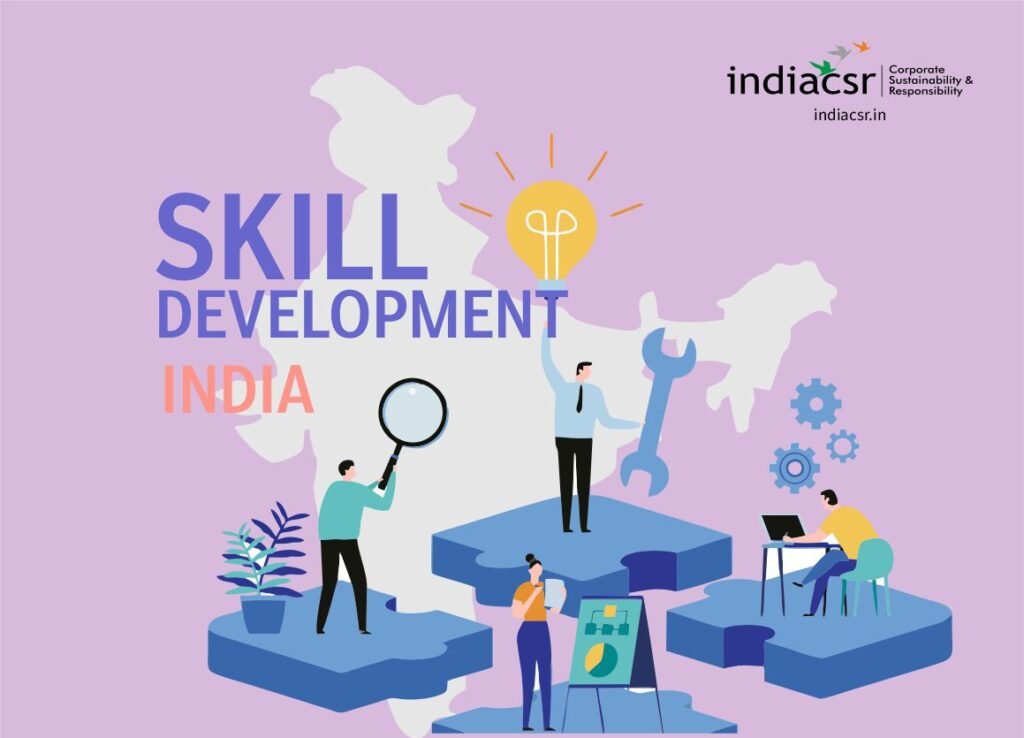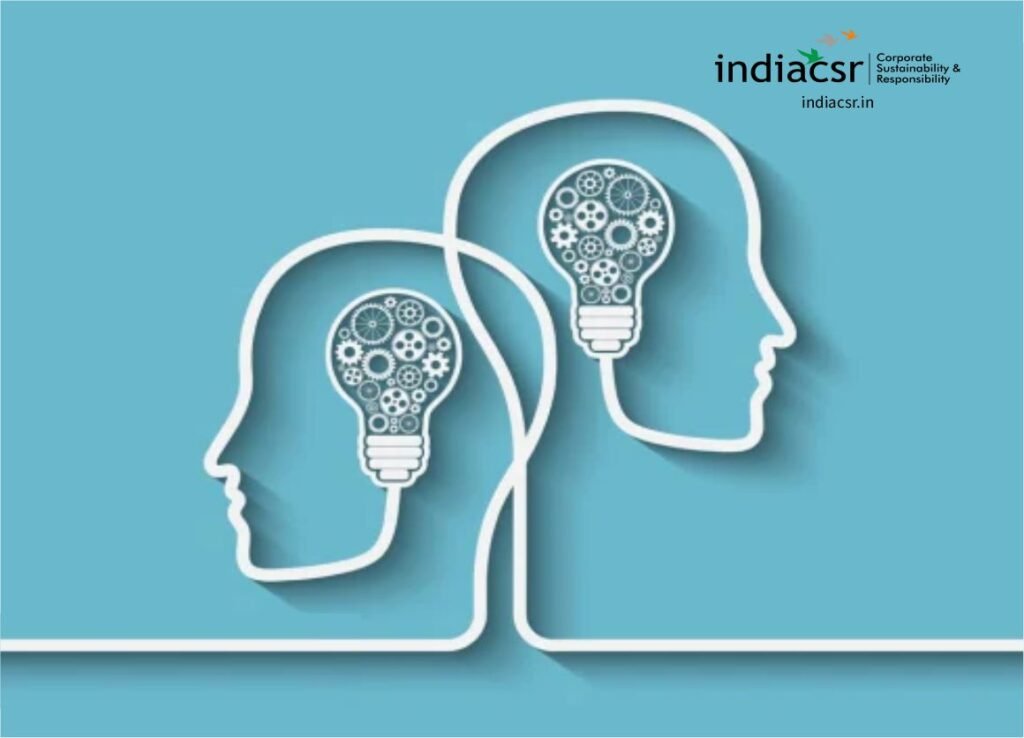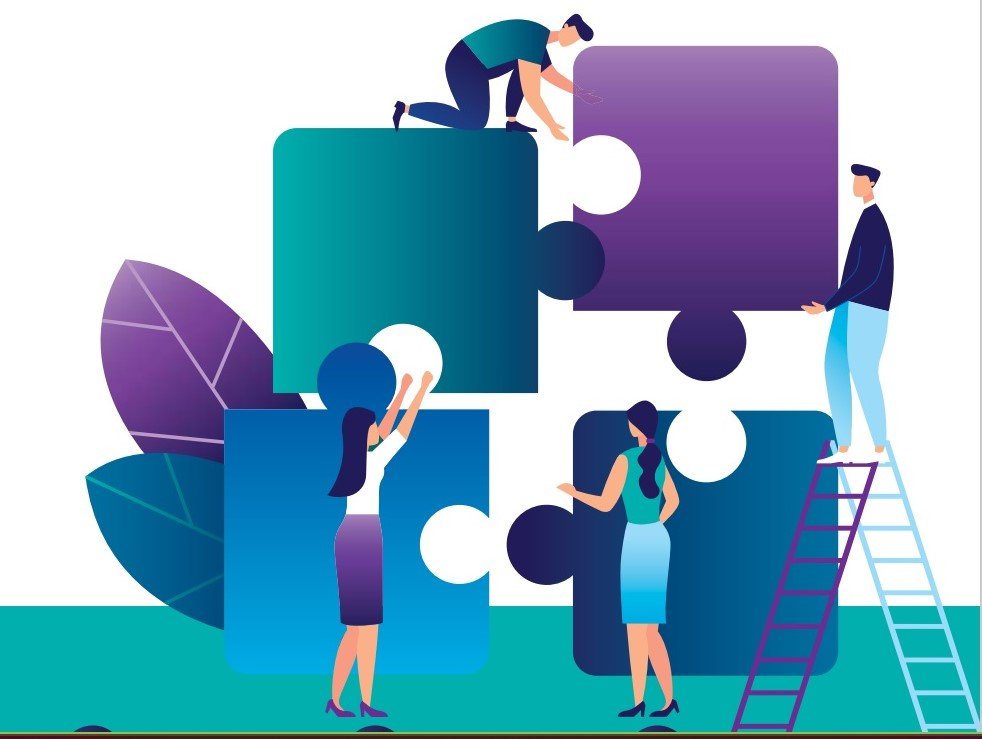The author suggests some of the top five reasons why skill is the new age currency for youth and why Skill India is a game-changer for them.
India has a demographic dividend of having the largest youth population in the world. According to the 2011 census, about 65% of India’s population is below the age of 35. [1] This means that India has a huge potential to harness the talent and energy of its young people and become a global leader in various fields. However, this potential also comes with a challenge. The challenge is to provide adequate education, training and employment opportunities to the youth and enable them to contribute to the nation’s development.
According to a report by the International Labour Organization (ILO), India’s youth unemployment rate was 10.4% in 2020, which is higher than the global average of 9.3%. Moreover, many of the youth who are employed are under-skilled, underpaid or under-utilized. This is where Skill India comes in. Skill India is a mission launched by the Government of India in 2015 to empower the youth with relevant skills and competencies that can enhance their employability and productivity.
Skill India aims to train over 40 crore people in various sectors and job roles by 2022 and provide them with certification, placement and entrepreneurship support.
What is Skill?
Skill is the ability to perform a task effectively and efficiently. Skill can be acquired through learning, practice, or experience. Skill can be classified into different types, such as technical, cognitive, interpersonal, or artistic. Skill can also vary in level, from basic to advanced. Skill can be applied in various domains, such as work, education, sports, hobbies, or everyday life. Skill can benefit a person in many ways, such as improving their performance, productivity, quality, creativity, satisfaction, and well-being. Skill is a valuable asset that can enhance a person’s personal and professional development.
Skill is not just about acquiring technical knowledge or performing a task. Skill is also about developing one’s personality, attitude and behaviour.

Role of Skills in Nation Building
Skills set is essential for nation building and sustainable development, as they enable people to contribute to the economic, social, and environmental well-being of their country and the world.
Some of the roles of skills in nation building are:
- Skills enhance productivity and competitiveness. Skills allow people to produce more goods and services with less resources and time. Skills also enable people to innovate and adapt to changing market demands and technological advancements. This improves the quality and quantity of output, as well as the income and employment opportunities for people. According to a report by the World Bank2, a 10% increase in average years of schooling can raise GDP per capita by 8% in low-income countries and 5% in middle-income countries.
- Skills foster social cohesion and inclusion. Skills help people to communicate, collaborate, and cooperate with others from diverse backgrounds and perspectives. Skills also empower people to participate in civic and political affairs, such as voting, volunteering, or campaigning. This strengthens the social fabric and the democratic values of a nation. According to a study by Harvard University3, civic education can increase political knowledge, tolerance, trust, efficacy, and participation among students.
- Skills support environmental sustainability. Skills enable people to adopt green practices and technologies that reduce the negative impacts of human activities on the environment. Skills also enable people to cope with and mitigate the effects of climate change and natural disasters. This enhances the resilience and adaptation capacity of a nation. According to a report by UNESCO [4], green skills can create new jobs, reduce poverty, improve health, and conserve natural resources.

What is Skill India Mission?
Skill India Mission is a government initiative launched in 2015 by Prime Minister Narendra Modi to promote skill India development in the country. It is an umbrella scheme that has many sub-schemes and programmes under it. The main objective of the mission is to empower the youth of the country with adequate skill sets that will enable their employment in relevant sectors and also improve productivity5.
Skill India Mission is a comprehensive and ambitious programme that aims to create a skilled and employable workforce for the country. It also aims to enhance the social and economic status of the youth and contribute to the nation’s growth and development. Skill India has undoubtedly opened doors for the youth. Skill Idnia allowed them to unleash their potential and shape a brighter future for themselves and their communities.
Some of the purposeful features and sub-schemes of Skill India Mission are:
- Pradhan Mantri Kaushal Vikas Yojana (PMKVY): This is the flagship scheme of Skill India Mission that provides free short-term skill training and certification to youth. It also provides monetary rewards to candidates who successfully complete the training and assessment. The scheme aims to train 10 million youth by 2020 6.
- Pradhan Mantri Kaushal Kendra (PMKK): These are state-of-the-art skill development centres that provide high-quality training infrastructure and courses across various sectors. There are more than 700 PMKKs operational across the country7 8.
- India International Skill Centres (IISC): These are skill centres that provide training and certification for overseas employment opportunities. They also provide pre-departure orientation, language and soft skills training, and counselling services. There are more than 100 IISCs operational across the country9 10.
- National Apprenticeship Promotion Scheme (NAPS): Under Skill India mission, the scheme that promotes apprenticeship training as a mode of skill development. It provides financial support to employers and apprentices for engaging in apprenticeship programmes. The scheme aims to increase the number of apprentices from 2.3 lakh to 50 lakh by 202011 12.
- National Skill Development Corporation (NSDC): NSDC is a key partner in Skill India. This is a public-private partnership organization that facilitates skill development through funding, capacity building, quality assurance, and innovation. It also implements various skill development schemes and programmes under Skill India Mission. It has a network of more than 11,000 training centres and 300 training partners across the country13 .

Skill a New Age Currency: Top 5 Reasons for Youth
Skill is the new age currency for youth because it can provide them with many benefits and advantages in the current and future labor market.
Here are some of the top five reasons why skill is the new age currency for youth and why Skill India is a game-changer for them:
1. Skill enhances self-confidence and self-reliance
Skill helps the youth to become more confident, self-reliant and resilient in facing the challenges and opportunities of life. Skill Indis Mission also helps the youth to discover their strengths, interests and passions and pursue them with zeal.
Mastery and Accomplishment
First, skill gives a person a sense of mastery and accomplishment. When a person learns a new skill or improves an existing one, they feel proud of their progress and achievement. They also feel more capable and competent in handling different situations and challenges. This boosts their self-esteem and self-worth.
Independence and Resourcefulness
Second, skill enables a person to become more independent and resourceful. When a person has a skill, they can rely on themselves to solve problems and meet their needs. They do not have to depend on others for help or guidance. They can also use their skill to create opportunities and generate income for themselves. This increases their self-reliance and autonomy.
Positive Attitude and Outlook
Third, skill fosters a positive attitude and outlook. When a person has a skill, they are more likely to enjoy what they do and find meaning and purpose in their work. They are also more likely to cope with stress and adversity and overcome obstacles. They can see challenges as opportunities to learn and grow rather than threats to avoid or fear. This enhances their self-confidence and optimism.
- Skill is a valuable asset that can improve a person’s self-confidence and self-reliance.
- Skill India empowers a person to achieve their goals, fulfill their potential, and live a satisfying and rewarding life.
2. Skill increases employability and income
Skill is what makes a person valuable in the market and society. Skill helps the youth to access better job opportunities and earn higher income. Skill India also helps the youth to adapt to changing technologies and demands and remain relevant in the dynamic world of work. Skill also enables the youth to create their own employment opportunities by becoming entrepreneurs or freelancers.
Quality and Innovation
First, skill enhances the quality and quantity of output. Skill allows a person to produce more goods and services with less resources and time. Skill also enables a person to innovate and adapt to changing market demands and technological advancements. This improves the performance, productivity, and profitability of a person.
Opportunities and Employment Choices
Second, skill expands the opportunities and choices. Skill allows a person to access more and better jobs in different sectors and regions. Skill also enables a person to create their own jobs by becoming entrepreneurs or freelancers. This increases the employability, mobility, and flexibility of a person.
Income and Enhances Status
Third, skill raises the income and status. Skill allows a person to earn more money and benefits from their work. Skill also enables a person to negotiate better terms and conditions for their work. This enhances the income, security, and dignity of a person.
- Skill is a valuable asset that can improve the employability and income of a person.
- Skill empowers a person to achieve their goals, fulfill their potential, and live a satisfying and rewarding life.
3. Skill fosters innovation and growth
Skill is what drives innovation and growth in any field or sector. Skill helps the youth to apply their creativity, problem-solving and critical thinking skills to find new solutions and improve existing ones. Skill also helps the youth to collaborate with others and learn from diverse perspectives and experiences. Skill also enables the youth to contribute to social and environmental causes and make a positive difference in the world.
Creativity and Problem-Solving
First, skill stimulates creativity and problem-solving. Skill allows a person to generate new ideas and solutions for existing or emerging challenges. Skill also enables a person to apply their knowledge and experience in novel and useful ways. This increases the innovation, diversity, and relevance of a person.
Continuous Learning and Adaptation
Second, skill supports learning and adaptation. Skill allows a person to acquire new knowledge and skills from various sources and methods. Skill also enables a person to update and upgrade their existing skills according to changing needs and opportunities. This enhances the learning, development, and resilience of a person.
Personal and Global Development
Third, skill contributes to development and progress. Skill allows a person to create value and impact for themselves and others. Skill also enables a person to participate in and benefit from the economic, social, and environmental development of their country and the world. This improves the growth, prosperity, and well-being of a person.
- Skill is a key factor that can foster innovation and growth of a person.
- Skill enables a person to unleash their potential, express their uniqueness, and make a difference in the world.
4. Skill bridges gaps and builds bridges
Skill is what bridges gaps and builds bridges between different groups of people, regions and countries. Skill India helps the youth to overcome barriers of language, culture, geography and background and connect with others on a common platform. Skill also helps the youth to access global opportunities and markets and become part of a larger community. Skill also enables the youth to appreciate diversity and promote harmony and peace.
Bridging the Education-Employment Gap
First, skill bridges the gap between education and employment. Skill allows a person to acquire the relevant and practical knowledge and skills that are needed for the current and future labor market. Skill also enables a person to update and upgrade their skills according to changing needs and opportunities. This improves the employability, mobility, and flexibility of a person. According to a report by the World Economic Forum14, 50% of all employees will need reskilling by 2025, as 85 million jobs may be displaced by automation.
Meeting Supply and Demand
Second, skill bridges the gap between supply and demand. Skill allows a person to meet the expectations and requirements of employers and customers. Skill also enables a person to innovate and create value and impact for themselves and others. This improves the performance, productivity, and profitability of a person. According to a report by LinkedIn15, 94% of employees would stay at a company longer if it invested in their learning and development.
Building Bridges Between People and Communities
Third, skill builds bridges between people and communities. Skill allows a person to communicate, collaborate, and cooperate with others from diverse backgrounds and perspectives. Skill India Mission also enables a person to participate in and benefit from the economic, social, and environmental development of their country and the world. This improves the social cohesion, inclusion, and well-being of a person. According to a report by UNESCO16, skills development can promote peace, tolerance, human rights, gender equality, and environmental sustainability.
- Skill is the ability to perform a task effectively and efficiently.
- Skill bridges gaps and builds bridges in many ways.
5. Skill empowers dreams and aspirations
Skill is what empowers the dreams and aspirations of the youth. Skill helps the youth to realize their full potential and achieve their goals. The skill also helps the youth to explore new horizons and possibilities and expand their vision. The Skill India programme also enables the youth to inspire others and become role models for future generations. One of the key benefits of Skill India is the ability to discover one’s strengths, interests, and passions.
Personal Satisfaction
First, skill enables a person to pursue their passion and interest. Skill allows a person to discover and develop their talents and potentials. The skill also enables a person to express their uniqueness and creativity. This improves the satisfaction, happiness, and fulfillment of a person. Skill India empowers the youth to become self-reliant.
Success and Ambitions
Second, skill helps a person to achieve their goals and ambitions. Skill India allows a person to plan and execute their actions and strategies. Skill also enables a person to overcome challenges and obstacles. This improves the confidence, resilience, and success of a person.
Making a Difference
Third, skill inspires a person to make a difference and leave a legacy. Skill allows a person to create value and impact for themselves and others. Skill also enables a person to contribute to the economic, social, and environmental development of their country and the world. This improves the dignity, respect, and recognition of a person.
- Skill is the ability to perform a task effectively and efficiently.
- Skill empowers dreams and aspirations in many ways.

Role of CSR Funds in Skill Youth
Corporate social responsibility (CSR) is a way for companies to contribute to the social and economic development of the country by spending a part of their profits on various social causes. One of the areas where CSR funds can make a significant impact is skilling the youth, especially those who come from disadvantaged backgrounds and lack access to quality education and training. Skill India has played a pivotal role in transforming the lives of the youth by enabling them to become more confident, self-reliant, and resilient.
Skilling the youth is crucial for India’s future. India has one of the largest and youngest workforces in the world. However, only one in five Indians in the labour force are skilled, and the proportion of formally skilled workers is just 4.69% of the total workforce17. This leads to unemployment, underemployment, low productivity and low wages for millions of workers.
CSR funds for Skill India can help bridge this skill gap by investing in various initiatives that provide vocational training, digital literacy, employability skills and entrepreneurship opportunities to the youth. Some examples of such CSR initiatives are:
- Unnati for India by Visionet Systems: This initiative aims to train 10,000 youth in digital skills such as coding, designing, data analytics and cloud computing by 202518.
- Youth Employment Program by Tata Consultancy Services: This program offers free IT training and certification to underprivileged youth and helps them find jobs in the IT sector19.
- ICICI Academy for Skills by ICICI Foundation: This academy offers vocational training in 13 trades such as electrical, refrigeration, retail sales, office administration and beauty therapy to rural and urban youth20.
- Microsoft Cybersecurity Program by Microsoft India: This program trains youth in cybersecurity skills and helps them get certified by NASSCOM Foundation21.
- Skills-for-Market Training (SMART) by Tech Mahindra Foundation: This program offers short-term courses in sectors such as hospitality, healthcare, retail, IT and BPO to urban youth from low-income families22.
These CSR initiatives have multiple benefits for the youth, the companies and the country. They help the youth gain relevant skills, confidence and employability, thereby improving their income and living standards. They also help the companies create a pool of skilled talent, enhance their brand value and reputation, and fulfil their social obligations. Moreover, they help the country boost its economic growth, competitiveness and innovation by harnessing its demographic dividend.
Skill India aims to provide vocational training and enhance employability among the Indian youth.
Therefore, CSR funds play a vital role in skilling the youth and preparing them for the future. CSR-funded development programmes with the anticipated future skills could be the best way to contribute to filling the skill deficit23. The government should also provide incentives and support to the companies that invest their CSR funds towards skilling the youth24. For companies in India, Skilling is not only a social responsibility but also a strategic investment for a better tomorrow.
About the Author
Ketan Deshpande is one of the top leaders working in India for skilling youth. He is Founder Chairman & CEO of FUEL – Friends Union For Energising Lives and Visiting Fellow JBS University of Cambridge UK.
Views are personal.
Also Read: Dr. Kalam inspired me to reach 1 million youths: Ketan Deshpande
Also Read: India: The Potential Skill Capital of the World by Ketan Deshpande







